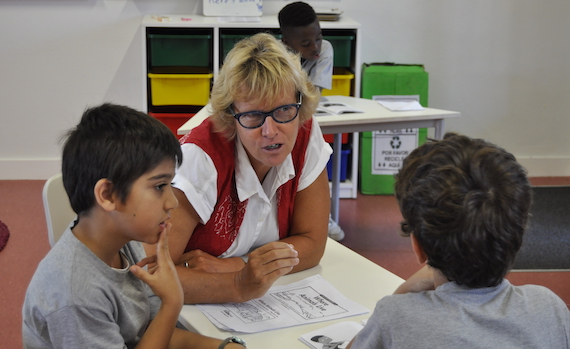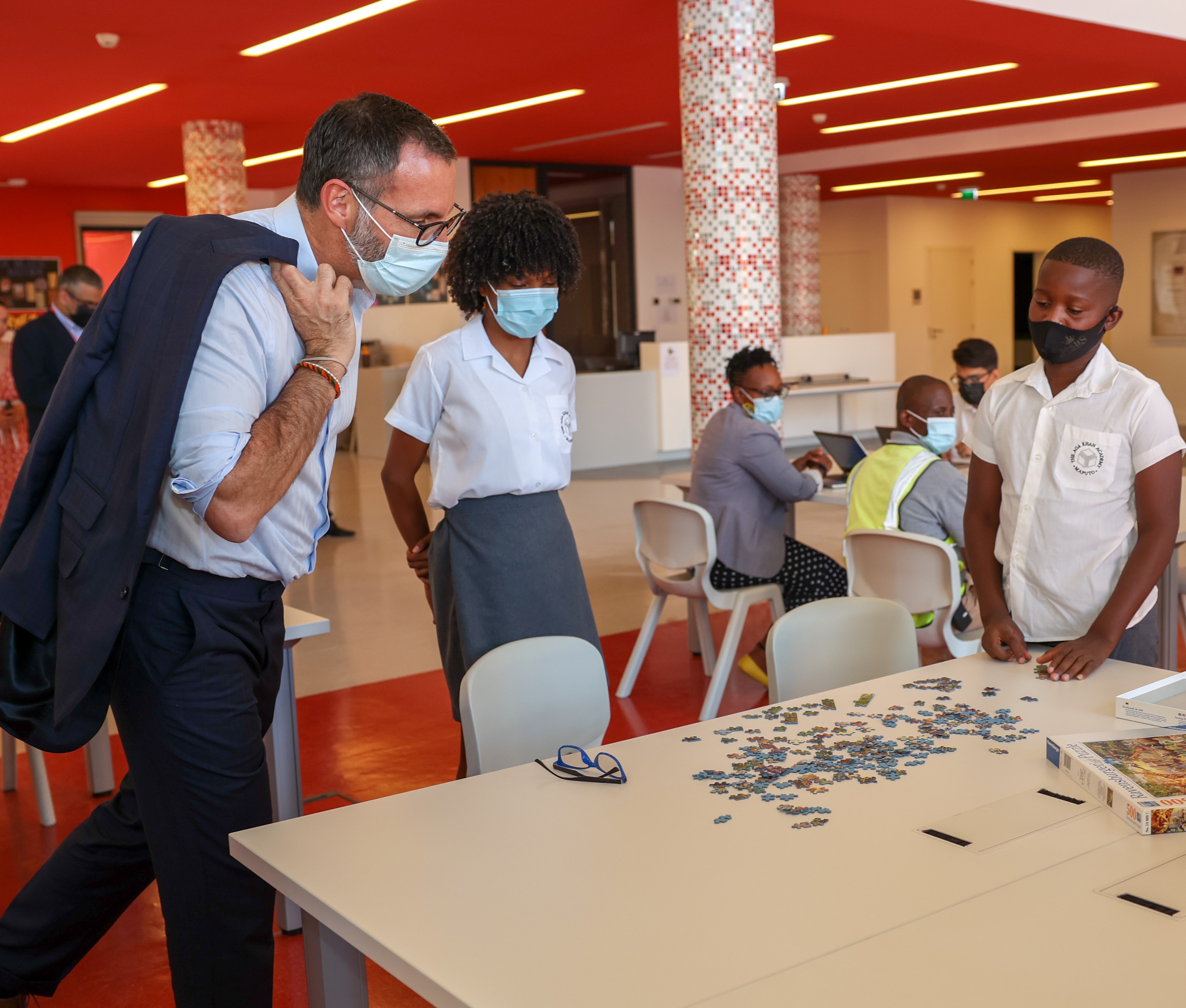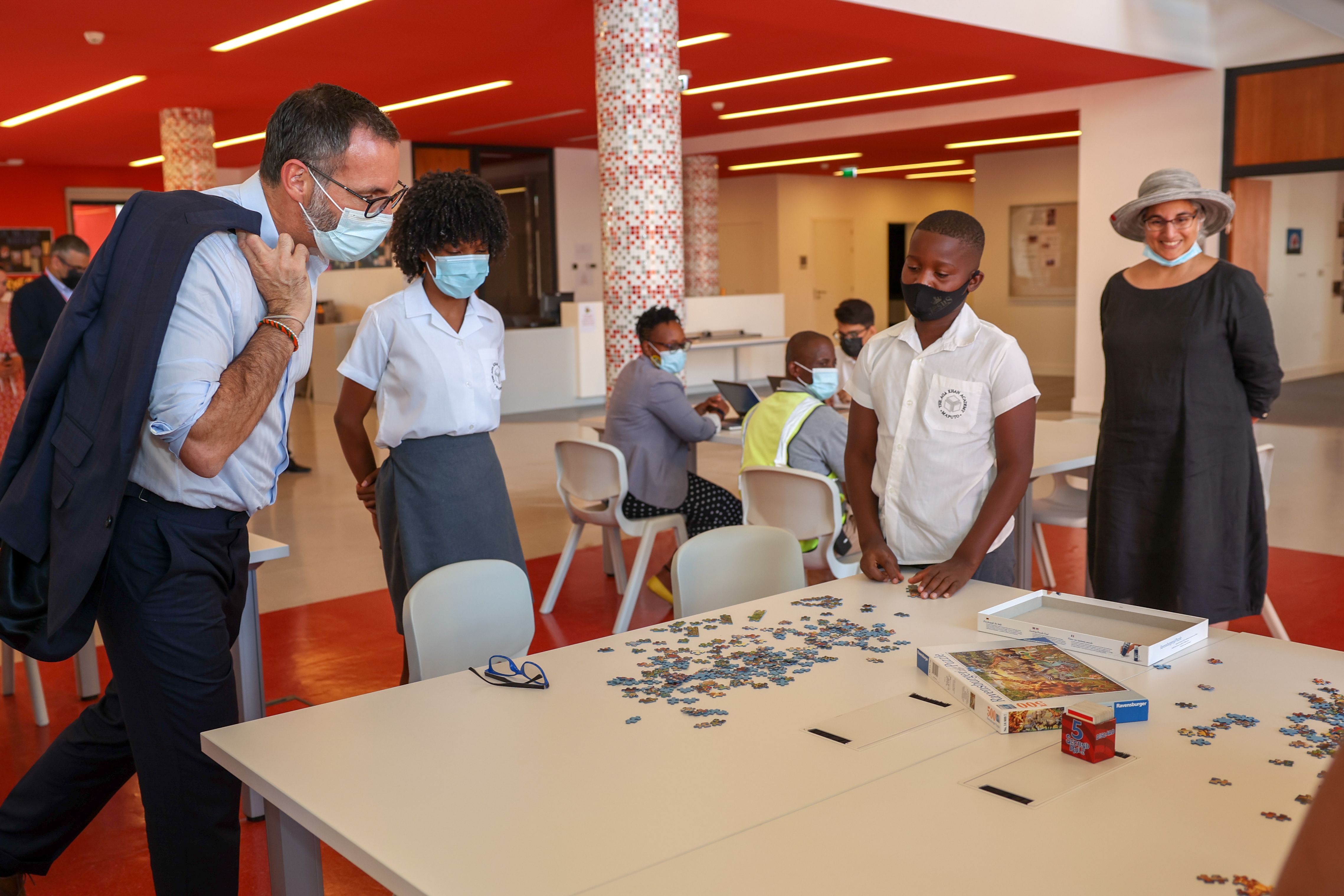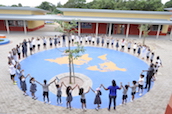Africa Day on 25 May
AKA Maputo will be celebrating Africa Day on Tuesday, 25 May 2021. All students are requested to come in their African attire for this day.
Start of 2022-2023 academic year
The 2022-2023 academic year at the Aga Khan Academy Maputo will start on Monday, 8 August 2022. Welcome back students and staff!
End of 2022-2023 academic year
The last day of school for the Aga Khan Academy Maputo will be 7 June. Students' pickup time is 2:00 pm.
Maike Silver: Cultivating Young Minds to Truly Make a Difference
Ask Maike Silver, Junior School Principal at the Aga Khan Academy in Maputo, Mozambique, what attracted her to teach at the Academy.
“The vision and mission of the Academy,” she states simply. “The vision to inspire young people into becoming future leaders of their countries. To actually have the ethical persuasion to make a difference in the lives of their countrymen.”
Originally from Germany, Maike says it was her father’s voluntary work in her hometown that swayed her into the teaching profession. “I was 12 years old when I started helping my dad coach young swimmers at our local hometown club. Ever since then, I have wanted to work with children and young people.”
Starting her teaching career at a German-American International School in California as an Early Years Specialist, Maike worked for 17 years, before embarking on her international educator journey, first to Cebu, Philippines, and then onto Maputo, Mozambique. She started working at AKA Maputo in 2018.
While she applauds the International Baccalaureate (IB) framework the Academy uses to guide teaching and learning, Maike also values the Aga Khan Curricular Strands of ethics, pluralism, economics for development, cultures, governance, and civil society. These play an important role in her instruction.
“It is these added leadership and stewardship attributes that empower students to care for their communities and that also provide a concentrated focus on local issues,” she states with conviction.
One of Maike’s main goals is to create an environment in which learning can be a positive and transformative experience and make a meaningful impact on students. Aware that young people flourish academically and emotionally in a constructive environment, Maike goes to great lengths to demand discipline for behaviours that maintain reverence and a sense of community and family in which every student feels valued. She feels strong peer relationships are important as are mutual trust and respect between students and between students and teachers.
“In order to be a great teacher several factors need to be in place,” Maike says with authority. “The classroom environment needs to be one of mutual respect where teachers and students connect and together create expectations for behaviour that uphold dignity, and a sense of caring for each other and a passion for learning,” she states solemnly.
In her opinion, teaching is one of the hardest and yet one of the most rewarding professions. “Being a teacher is a difficult occupation as it requires a tremendous amount of energy to keep children engaged in their learning as well as show compassion for all categories of different learners. The job entails diplomacy and resilience when dealing with the different demands from parents, students and administrators.”
Aware of the importance of being prepared before teaching a class, Maike states emphatically that a teacher needs to plan activities and strategies with a strong sense of commitment in order to inspire students.
“The teacher needs to plan engaging activities that have a clear sense of purpose and where the outcome can be assessed. At the same time, the teacher needs to be responsive to the needs of students and must be flexible in their planning. This requires a teacher to be open-minded and reflective,” she notes.
If Maike carries a sense of manifest destiny for her students, she credits the Academy’s IB curriculum of a holistic education. Saying it is critical for educators to train students to think critically and creatively, and to be able to transfer their knowledge to real-life situations, she quotes Ernest LeRoy Boyer, who was a distinguished American educator, who once said “To be truly educated, a student must …make connections across the disciplines, discover ways to integrate subjects and ultimately relate what they learn to life."
Maike has savored every moment of being part of the AKA Maputo family. “I feel it is a tremendous honour and responsibility to be part of creating sustainable systems for a newly-developing Academy. I hope to leave behind a legacy of having been a kind, compassionate and effective leader who played an essential part in providing our young leaders of the future with the highest quality of education that prepares them to enact positive change in the world they inhabit.”
Written by Perviz Walji
Happy New Year from the Aga Khan Academies
Dear friends of the Aga Khan Academies,
Happy New Year to you and your families from all of us at the Aga Khan Academies.
As we look toward 2018, I’m pleased to share with you some of the exciting developments that the Academies are anticipating for the coming year.
Across the Aga Khan Development Network, we will be continuing to celebrate the Diamond Jubilee of His Highness the Aga Khan, marking 60 years of his enlightened leadership as the Imam of the Ismaili Muslims and founder of the AKDN. The Jubilee commemorations began on 11 July 2017 and will continue until July 2018. The Aga Khan Academies have been running two social media initiatives in honour of the Diamond Jubilee – Academies ‘Journeys’ and ‘60 Stories for 60 Years’ – and these will continue through this July. I hope you are enjoying them.
The Jubilee year marks a time of increasing expansion of the Aga Khan Academies. Construction of the full campus for our third Academy in Maputo, Mozambique has proceeded rapidly, and our students and staff are looking forward to the opening of the beautiful new school buildings that will house students from grades 3–7 in the very near future. The Academy in Maputo also expanded their curricular offering this academic year, having introduced the International Baccalaureate (IB) Middle Years Programme, which has been received very well by our students and teachers.I’m also very pleased to share that our fourth Aga Khan Academy in Dhaka, Bangladesh will begin construction in 2018. The design for the forthcoming Academy won the award for best ‘Future Education’ project at the World Architecture Festival 2017. We’re looking forward to seeing the vision behind the award-winning design come to life, to provide talented students from Bangladesh and the region with a world-class education, regardless of their socioeconomic background.
In 2018 we will also be celebrating 15 years of the Aga Khan Academies network, with our first Academy in Mombasa, Kenya having opened in 2003. During the past 15 years, the Academies have pioneered innovative approaches in a multitude of areas, including the cross-curricular Aga Khan Strands, approaches to leadership development and service learning, campus design for a well-rounded education, talent identification, and developing local teachers into IB practitioners, amongst others. As our network grows, we are continuing to see the power of becoming a global, closely integrated and pluralistic learning community that allows sharing of ideas, expertise and thinking across varied contexts and cultures.
We greatly value your support for the Aga Khan Academies and our collective effort towards creating a better future through education.
Wishing you and your families the very best for 2018.
Warm regards,
Salim A.L. Bhatia
Director of Academies
Mary Favour (Class of 2015): Ambitions to build a better future
For a while, getting an education was a process for Mary Favour. She would rise early in the dark – at 4:00 am – and make the long trek to school on foot with her three siblings, arriving at around 6:30 am each day. By the time they returned home to Mombasa, it was 7:00 pm. The rest of the evening was spent helping their mother around the house and finishing their homework.
It wasn’t easy, Mary recalled.
“My sisters and I grew up with a single mother,” she said. And resources were tight.
When the electricity bill wasn’t paid, the Favour children would study under the dim glow of a kerosene lamp or by candlelight. The four siblings had limited school supplies and relied on Mary for many of their study materials.
“We got awarded books if we topped the class,” she explained. “Sometimes we’d get textbooks, other times we’d get storybooks or novels. It was an incentive that the teachers had to motivate students.”
A new opportunity at the Aga Khan Academy Mombasa
Despite the obstacles, Mary said her mother was determined for her to succeed. She pooled her resources to give Mary a much-needed laptop in grade 9. By then, things had begun to turn around – Mary had received a full scholarship to study and live at the Aga Khan Academy Mombasa as part of its Talent Identification Programme, a programme that provides students from more disadvantaged backgrounds the opportunity to attend the Academy on full scholarship. She would graduate in 2015 and go on to study at the University of Toronto in Canada, also on full scholarship.
Now a second-year student at university, Mary hasn’t forgotten her difficult upbringing or her roots. In fact, the struggle to get an education early on has instilled in her a strong desire to give back to her community and help others like her get a shot at a better life.
“Six years of growth, skill and a good education” at the Academy was “a gift,” Mary said. “I want to [give] a gift to someone else.”
In particular, she’s learned the importance of independence, humility and sacrifice – lessons she put to use during her Academy days.
Mary joined the Aga Khan Academy in 2009 as part of the first batch of students in the Talent Identification Programme. While there, she participated in a range of activities, including choir, soccer and debate, with the same level of perseverance her mother had taught her. She quickly excelled academically, becoming an honors student in grade 10, and also challenged herself in extracurriculars – musically in competitions and as the assistant captain of her hockey team.
Helping others through community service
Beyond this, Mary fostered a passion for community service and activism rooted in her desire to help outsiders fit in. She led the ‘Just Say No’ initiative, a programme focused on rehabilitating primary school girls in Mombasa who had turned to prostitution in large part to support their families financially.
She worked with these girls for three years, exposing them to the same opportunities she and other students had the privilege of in their own education, including sports and debate. She hosted workshops on public speaking and art, as well as sessions with counsellors and strong female mentors, and invited the girls to perform at the Academy’s talent competition.
“The aim was to help them feel integrated into society but at the same time equip them with skills that would make their education holistic,” Mary said. The mission was especially important, she said, because of the gender gap she saw in Mombasa’s primary schools and the way in which this unfair system contributed to larger problems down the line.
“That inequality creates an imbalance that marginalizes women in our society,” Mary said.
Under her leadership, the club received three awards and became one of the most successful student groups on campus.
Supporting other students to succeed
In addition, Mary founded the ‘I Know Who I Am’ initiative, a programme that integrates scholarship students like herself into the Academy community while understanding that they needed to “stay in touch with home and not forget their society,” as Mary explained.
“I wanted to celebrate the diversity that came with these students but at the same time make sure that they don’t lose themselves,” she said. So she ran workshops on pluralism and open-mindedness, ate food and played games the students would recognise from home and “held discussions on what it meant to be part of a community but remain true to yourself.”
In the summer of 2017, Mary interned with the Students for International Development. The non-profit organisation was founded and is run by students. While there, she worked with the Orphan Sponsorship Programme as project manager for about two months. Mary and her team focused on the Simboyi Primary School in Vihiga, in the west of Kenya. They were in charge of the remedial education project for orphans and also worked on projects to support students financially.
After conducting interviews with some of the students in Vihiga, Mary and her team developed a means by which to help them be better equipped to reach their full potential. According to Mary, a number of the students came from families that were struggling to make ends meet. Some, she recalled, told her they only had one meal per day, which usually consisted of just ugali or porridge. Others said they didn’t eat at all. Further, a number of those who performed well in class were unable to pay for their exams and had to sit them out instead.
With Mary’s help, the organisation created a scholarship to help these students. The award, which she said covers basic health care, one meal a day, a yearly uniform and exam fees, will be able to assist 55 students during the current academic year at Simboyi. The hope is that the sponsorships will continue into the next year if budget and fundraising allow.
Real-time results and change like this mean the world for Mary, not least because she knows firsthand what it’s like to have the academic situation and resources not in your favour.
“I was a child with big dreams and no way of actualising them until I joined the Academy,“ she said. “I want to be for someone else what the Academy was to me.”
Catalyzing change for a better future
Mary believes education is one of the best tools to rid our societies of poverty, and she’s determined to be in a position to support students so they have better paths forward at their disposal than what she had. That’s why she plans on returning to Kenya after she’s obtained the necessary experience and skillset to properly give back to her country and community.
Currently majoring in human geography and diaspora and transnational studies and minoring in African studies, Mary thinks that, through the study of cultures and international development, she can better understand how to bridge the gap between rich and poor at home. Her hope is to protect the rich cultural diversity of Kenya but also contribute to changing the country so that it is better able to develop and sustain itself and compete and interact on a global scale more effectively.
“Kenya is at such a pivotal moment in the making of African history,” she said. “It has so much potential. I just want her to maximize her potential. I want to help her do it.”
Mary is uniquely positioned to kickstart such a change at home. Her pluralistic perspective on the world and passion for country could be just what Kenyans need to motivate their leaders to be better and to take action to institute real change. And if her triumphs at the Academy are any indication, Mary’s motivation may just be contagious.
By Farah Mohamed
Sports Award Ceremony
On Friday May 17 from 3-4 pm we will be celebrating the acheivements of Senior School students in Sports.








